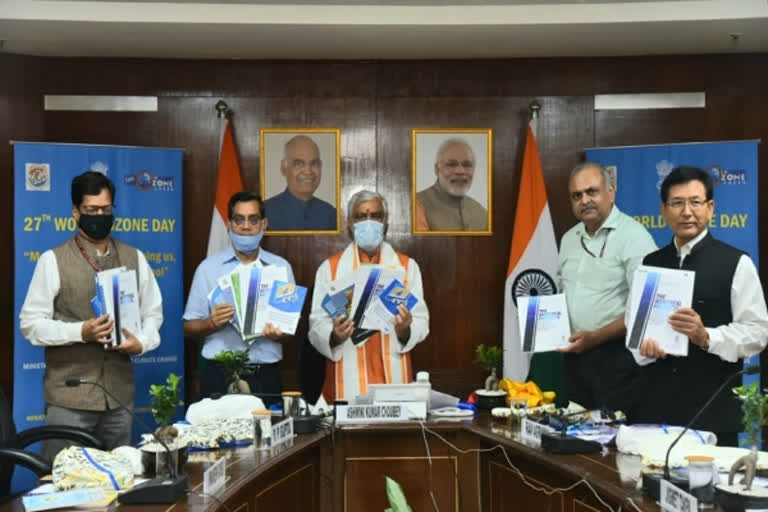New Delhi: On the occasion of the 27th Global Ozone Day, the Ministry of Environment, Forest and Climate Change released an Action Plan for implementing recommendations of the India Cooling Action Plan (ICAP) for the thematic Area Space Cooling in Buildings.
The India cooling action plan (ICAP), the first of its kind in the world, addresses cooling requirements across sectors and lists out actions that can help reduce the cooling demand through synergies in actions for securing both environmental and socio-economic benefits, aiming to reduce both direct and indirect emissions.
While addressing the launching event, Minister of State for Environment, Ashwini Kumar Choubey said that India has successfully phased out production and consumption of several major Ozone Depleting Substances (ODS) and met all the obligations of the Montreal Protocol so far, by accessing technical and financial assistance from the financial mechanism of the Montreal Protocol.
He added, "One of the reasons to India’s success in phasing out of the Ozone Depleting Substances is the involvement of key stakeholders both at the planning as well as implementation levels."
Also read:India joins league of countries having Cooling Action Plan
Referring to the Kigali Amendment to the Montreal Protocol, which was recently ratified by the Government of India, the Minister said, issues relating to minimizing industrial obsolescence and adverse economic impacts should appropriately be addressed while developing a Hydrofluorocarbon phase down strategy for implementing it.
World Ozone Day is celebrated on 16th September each year to commemorate the signing of the Montreal Protocol, an international environmental treaty for phasing out of production and consumption of Ozone Depleting Substances, that came into force on this day in 1987.
The Minister also released a Study Report on the Cold Chain sector in India for Promoting non-ozone-depleting substances and Low-global warming potential Refrigerants and another Study Report on Public Procurement Policies for Refrigeration and Air-Conditioning Equipment using non-Ozone Depleting Substances based refrigerants.
On the occasion of World Ozone Day, Copernicus Atmosphere Monitoring Service experts informed that the puncture in the South Pole is now amongst 25% of the widest recognised ones. The gap has grown bigger than Antarctica and is the widest recorded hole in the season since 1979.
India, as a party to the Montreal Protocol since June 1992, has been successfully implementing the Montreal Protocol and its Ozone Depleting Substances phase-out projects and activities in line with the phase-out schedule of the Protocol. India has phased out Chlorofluorocarbons, Carbon tetrachloride, Halons, Methyl Bromide and Methyl Chloroform for controlled uses in line with the Montreal Protocol.
Also read:Climate change greatest challenge to human rights: UN official
Currently, Hydrochlorofluorocarbons are being phased out as per the accelerated schedule of the Montreal Protocol. Hydrochlorofluorocarbons Phase-out Management Plan (HPMP) Stage-I was being successfully implemented from 2012 to 2016, while Hydrochlorofluorocarbons Phase-out Management Plan (HPMP) Stage-II is currently under implementation from 2017 and will be completed by 2023.
